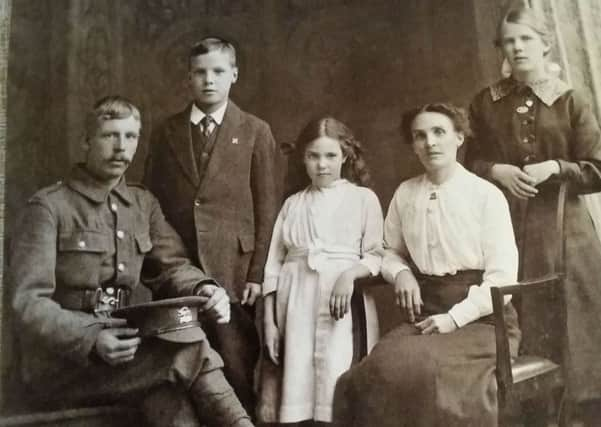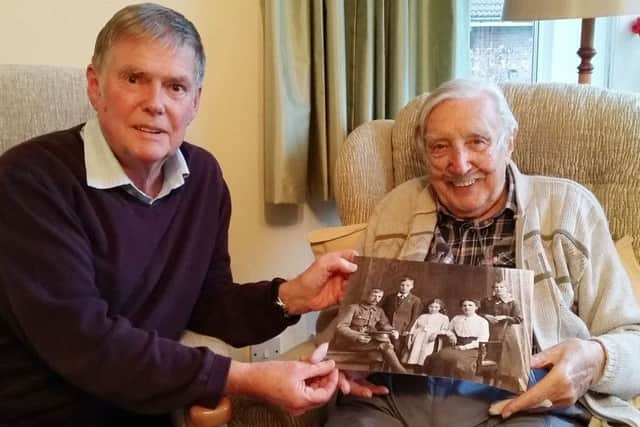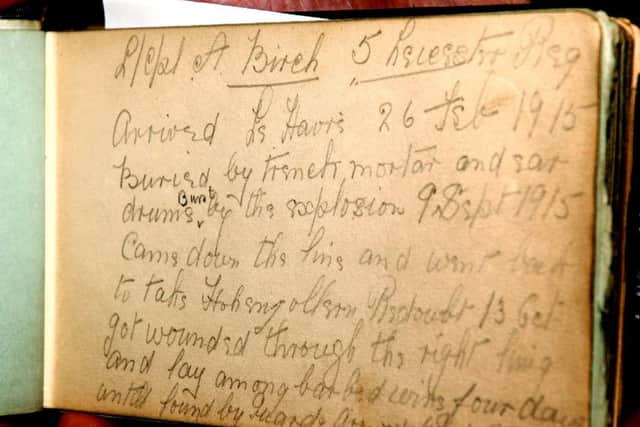Rare autograph book emerges giving an insight into Melton's role in the First World War


It was owned by Fred Radford, who was a young boy who ran errands for the servicemen and chatted to them while they were treated at Wicklow Lodge after being shipped back home from the battlefields of the Western Front and other areas of fierce fighting.
The book is now a treasured possession of Fred’s son, Peter (91), who lives in Hose.
Advertisement
Hide AdAdvertisement
Hide AdIt contains pages with signatures from soldiers and an account of their war service and how they were injured, all beautifully hand written by them in pencil.


Peter said: “My dad was very proud of this book. He used to talk about how the soldiers would tell him about how they were wounded. I’m not ashamed to say I cry when I read some of the stories.”
Wicklow Lodge, in Burton Road, is now converted into flats and apartments. In January 1915, it started being used as a 50-bed auxiliary military hospital where 1,484 wounded and sick soldiers were eventually treated over the course of the Great War.
The spirits of many of the servicemen were raised by Fred Radford, an 11-year-old boy Scout who had been educated at the Melton Mowbray British School.
Advertisement
Hide AdAdvertisement
Hide AdPeter, who is married to Beryl (87) and has three children, three grandchildren and two great-grandchildren, said: “Someone had told him that soldiers from the war were up at Wicklow Lodge and he decided to go along to see if he could help.


“He would talk to them and go off on his bike to pick up cigarettes for them and many of them signed his book.”
Tragically, Fred’s father, Thomas, was killed in Ribemont, France, just a few months before the end of the war.
Fred had a taste for army life, though, and he joined the Royal Horse Artillery at the end of the war and spent time at Melton’s Remount Depot - now the Defence Animal Centre - breaking in horses for military service.
Advertisement
Hide AdAdvertisement
Hide AdHis beloved autograph book remained hidden from public view until Peter was visited by Melton historian Derek Simmonds, who was bringing him a copy of his new book, Our Unforgetten Debt, which details the exploits of the district’s Territorials during the First World War.


Derek was excited to be shown the wartime autograph book, which contains an entry from Melton soldier Arthur Birch, who also features in his own book.
Before the war, Arthur was living at 27 Clumber Street with his wife, Mary Josephine, and worked at the Holwell Iron Company as a Core Maker. At the age of 28, he was one of the first Melton Territorials to march to war in August 1914.
But he was wounded and after being shipped home to be treated at Wicklow Lodge he wrote in young Fred’s book:
Advertisement
Hide AdAdvertisement
Hide Ad“Arrived at Le Harve 26th Feb. 1915. Buried by a Trench Mortar and ear drums burst by this explosion. 9th Sept. 1915. Came down the line and went back to take Hohenzollern Redoubt Oct. 13th. Got wounded through the right lung and lay among the barbed wire for four days until found by Guards.”


Derek considers the autograph book to be a unique and vital artefact on life in Melton during the Great War and he plans to pass it on to the Leicestershire and Rutland Record Office to be kept safely for future generations.
He added: “I was absolutely amazed when I saw the book. It’s lovely that a lot of the soldiers mention in their entry in the book how helpful their boy Scout Fred had been to them while they were there.”
A commemorative green plaque is to be installed on the wall of Wicklow Lodge later this year to recognise its part in the war effort and Derek is hopeful a descendant of Arthur Birch may come forward to be present at the ceremony.
Advertisement
Hide AdAdvertisement
Hide AdHe added: “These lads should be remembered, these survivors who came back, some of them injured who had to then love through the Depression in the 1920s.
“They would have with their traumas from the war and then their sons had to do the same thing again in the Second World War in 1939.”